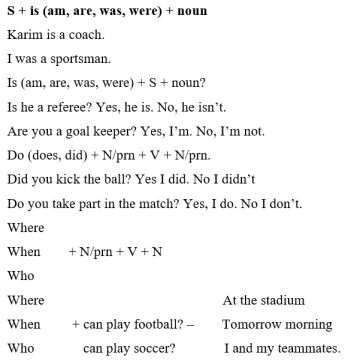Before speaking about role plays and didactic games which are important to teach English, we will try to clarify the meaning of the word “Game”. In the “Merriam-Webster Dictionary” there are following definitions
- Activity engaged in for diversion or amusement.
- A procedure or strategy for gaining an end.
- A physical or mental competition conducted according to rules with the participants in direct opposition to opposition to each other.
Games are important for the students and pupils.
We have come to the idea that the activities of games are the methods of education.
Oral speech should be taught to a pupil from initial classes. If pupils are used to answer for ordinary questions and to make up sentences according to one system it is important for teachers not to think about children’s development in oral speech.
For example, a student can tell ‘I see a ball. I see many balls in the yard’ and something like that kind, anyway, he speaks in English, we should not consider the words told as the real oral speech. In these positions, pupils do some more oral exercises.
In the process of lesson, several questions should be given according to sports. It is false to conduct the lesson following the rules of only textbooks.
Do you like sports?
What sport do you like?
Do you like to play football?
Do you like to swim?
Did you go to the hockey game on Sunday?
Does your brother swim well?
What sport dos your brother like?
Who is the best football player in Uzbekistan?
Who is the best volleyball player in the world?
Who is the best swimmer in your group?
It is acceptable to give answers to these kinds of questions and making up short dialogues and playing them as role plays. Oral speech and studying deeply should be organized to be extra lessons in academic lyceums and sport schools.
True to life conversation
Students of academic lyceums and sport schools make unprepared conversation with group mates and teachers. In the next classes, basically they participate in Pairs. Amazement, amusement, regret (really, do you? Did you? Were you? Are you? It’s a pity, I’m sure) are used to converse. In colleges, circle conversation is made mostly. In this, students should be taught to use some ethical words. (I think; I’m afraid; I’m not sure but; No doubt, so on).
Making discussions
Exchanging ideas are required to come to one group and a pair about school, sports a matters of accidents.
– Do you see that tall man?
– Yes, I do. Who is he?
– He is Mr. Brown.
– He is a strong and broad shouldered.
– Yes, he is a sportsman. He is a tennis player.
– Is he a master of sports?
– Yes he is. He is national all round champion.
– Thank you.
- — You know what we must do in order to become healthy and strong?
- — I think, one must go for a long walk in the mornings and evenings.
- — You are right, but to my mind one must go in for sports.
- — Oh, yes. That’s why I have been playing football for two years.
To tell the meaning of text read in roles. Besides conveying the matters and ideas of heroes, opinions are joined.
A student plays games being interested, uses entire knowledge, strives to win, takes education, teachers bring up students through them. If a student speaks when playing, he will be interested in that he can understand by listening, is able to read and win.
Role and situational games are important to develop the monologic and dialogic speech of students. Student will not be shocked in a vital situation and he/she will be ready what to say. We can give some examples as follows:
“From word to word”
Teacher writes a word on the board or makes the column of the words using the letters of the word. A word should include as many words as possible which enhances the students’ chances. For example: if a word ‘sport’ is written, words should be found for its each letters and sentences are made.

We can continue the register. At first sight, no effect of oral speech can be seen. But it is not so. Here, however the orthography, written speech seem to be first, most important source of oral speech, especially speaking is a word. Consequently, the more words are taught to pupils, the more his/her oral speech is increased. Pupils can use those words which they want to choose. The importance of speaking is vocabulary. We do speaking as this position. Game can be changed or continued according to the theme.
To develop the monologic and dialogic speech of in the procedure of conducting the themes, the interest of a pupil can be run out because this process seem a bit difficult. Therefore, teaching by examples of sentences including rules can affect. The experiences which were made at the time of pedagogical practice are seen as the truth for our idea.
For example, easy and simple models when making affirmative and interrogative sentences and using in speech are following:

Expressing the opinions with courteousness and modesty at the time of conversation is important. At the time of conversation, reckoning the formal and informal situation and using the suitable speech sources is important. We recommend using following discourse markers:
I think — mening fikrimcha.
To my mind — menimcha.
In my mind — mening nuqtai nazarimcha.
I’m afraid (he won’t come) — kelmasmikan, deb qo`rqaman.
I’m sure — ichonchim komil.
I’m not sure — ichonchim komil emas.
Certainly (of course) — albatta.
You are welcome — hush kelibsiz, bajonudil.
Esteemed guests — qadrli mehmonlar.
Excuse me (I am sorry) — uzr.
Could you tell me the score? — Holatni aytib bera olasizmi?
Can I be any service to you? — xizmat? etc.
References:
- Anitchkov I., SaakyantsV. Methods of teaching English. Moscow, 1966.- 248p.
- Harner Jeremy. The practice of English language teaching. L. — New York, 1991.-296p.
- Rogova G. Methods of teaching English. Leningrad, 1975.- 312p.
- Загвязинский В. И. Методология и методика дидактических исследований.- М: Педагогика, 1982
- Зимняя И. А. Психологическая характеристика слушания и говорения как видов речевой деятельности. — «Иностранные языки в школе», 1973







